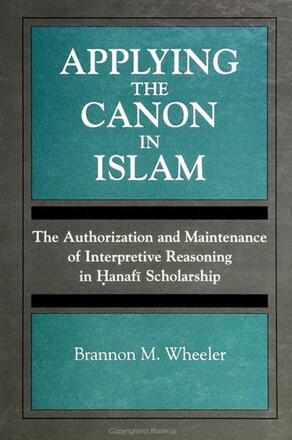
Applying the Canon in Islam
The Authorization and Maintenance of Interpretive Reasoning in Ḥanafī Scholarship
Alternative formats available from:
Argues how the notion of "canon" is used to authorize and maintain certain types of interpretive reasoning and the social institutions that employ them.
Description
Using examples from Islamic law, Ndembu divination, and Aranda religion, this book argues how the notion of "canon" is used to authorize and maintain certain types of interpretive reasoning and the social institutions that employ them. The bulk of the book outlines how the Ḥanafī school of Islamic law was able to legitimize itself by extending the canonical authority of the Qur'an to the sunnah of the prophet, the opinions of selected local authorities, and the scholarship of earlier generations. The Ḥanafī example shows that the application of canon is not about overcoming the limits of a "closed" text but rather about imposing limits on a range of interpretations made possible by a variegated and malleable textual corpus.
Brannon M. Wheeler is Assistant Professor of Religious Studies and History at Pennsylvania State University.
Reviews
"This is an excellent survey of the Islamic legal tradition of the early H school, from the viewpoint of scriptural interpretation and canonical authority. This is arguably a centrally important topic for Islamic studies. It brings a much-needed theoretical application of categories developed for the history of religions to a subject that is well-known only to a few specialists.
"The carefully crafted historical and textual argument contains many surprises for non-specialists, running against the received wisdom regarding the total scriptural supremacy of Qur'an and hth. The concentration of authority in the opinions of legal scholars was not merely a pedagogical method, but as Wheeler shows, an epistemological one. This analysis helps to explain what is surely one of the most distinctive aspects of the Islamic tradition, namely the development of legal authority as a quasi-separate edifice atop the structure of scripture. There is a thorough mastery of current scholarship and an impressive documentation of the cases used by the masters of Islamic legal thought to form their discipline." -- Carl W. Ernst, University of North Carolina-Chapel Hill
"The topic of this book (how to account for the patterns of reasoning used by Islamic exegetes) contributes to a set of questions of central theoretical importance to several disciplines in the humanities. Literary critics, scholars of religion, historians--all are paying more attention to the genre of commentary as among the most important genres in virtually all cultures. Wheeler's work makes real theoretical advances in understanding Islamic exegetical method, and by doing so will also make a contribution to the broader discussion in the humanities." -- Paul J. Griffiths, Divinity School, University of Chicago